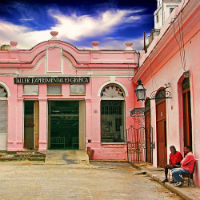Curriculum Resources

« All Topics
Cuba
Cuba is an island nation in the Caribbean Sea, famous for the 1959 Socialist Revolution of Fidel Castro which ushered in a controversial era of communism.
Lesson Guides and Classroom Activities:
Cuba: Perspective and Bias (film and Project Based Learning Lesson Plan)
Grade Levels: 9-12, College
Subject Area(s): Social Studies, History
This lesson plan utilizes the documentary American Experience: Fidel Castro to urge students to consider the significance of bias, perspective, and political neutrality. It also prompts students to develop a more nuanced understanding of Fidel Castro and Cuban political history. The lesson plan asks students to research the documentary as a genre of source, and to reflect on how the source and funding of the documentary affected its content and presentation. It serves as a gateway to a Project Based Learning activity in which students do self-directed research on a part of Cuban history/society referenced in the film.
Grade Levels: 5–8, 9–12, College
Subject Area(s): Social Studies, Spanish, History
This lesson plan pairs the documentary Maestra with a clip from the film American Experience: Fidel Castro. It highlights the importance of literacy in post-revolutionary Cuba and teaches the literacy movement as a lens through which to study turning points in Cuban history, as major shifts in policy and history affected volunteer literacy teachers. This curriculum also draws connections between literacy more broadly and political literacy/the importance of rhetoric to Fidel Castro's regime. By incorporating clips of Fidel Castro, and of volunteer teachers, this lesson plan urges students to consider literacy's role in history, politics, and culture in Cuba and beyond.
Images of Cuba: Bringing Cuba to Life in your Classroom with Photographs
Grade Levels: 5–8, 9–12, College
Subject Area(s): Spanish, Social Studies, Fine Arts, History
This curriculum guide highlights the role that photojournalism and/or portrait photography can play in our understandings of other places and persons. In this case: Cuba. Whether part of lesson plans in Spanish, English, History, or Social Studies classrooms, photographs fosters curiosity, and creates a more direct, visual connection between learners and the persons and places that they learn about. Furthermore, photographs allow educators to emphasize visual literacy, or on the constructed nature of visual images, and the components that lend to a mood or emphasis of a photograph.
Maestra Film Guide for Educators
Grade Levels: 9–12, College
Subject Area(s): Spanish, Social Studies
Discussion guide for the film Maestra which documents the role of women in the 1961 Cuban Literacy Campaign.
They Are We: Educator Guide
Grade Levels: 9–12, College
Subject Area(s): Spanish, Social Studies, Dance, Music
This thorough guide to the documentary film They Are We discusses the African Slave Trade in Latin America and the Afro-Cuban culture and influence. Four classroom applications about Afro-Cuban Culture, cultural identity of Afro-Latinos, Afro-Cuban music and influences, and contemporary Afro-descendants in Latin America. This guide includes a list of discussion questions to accompany the film, as well as an extensive glossary and appendix of activities.
Lesson Plans
Collection
Cuba: Histories of the Present - Photographs
PDF
Cuba: Perspective and Bias (film and Project Based Learning Lesson Plan)
Grade Levels: 9–12, College
PDF
Cuban Literacy Project: Literacy, Language and History: Cuba 1961
Grade Levels: 5–8, 9–12, College
DOC
Images of Cuba: Bringing Cuba to Life in your Classroom with Photographs
Grade Levels: 5–8, 9–12, College
CLAS Lending Library Resources
Book
Uncommon Grounds: The History of Coffee and How it Was Transformed Our World
Grade Levels: 9–12, College
